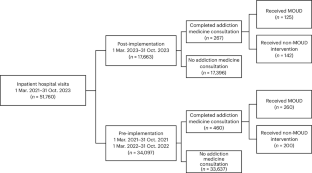2025-04-03 アメリカ国立衛生研究所(NIH)
ChatGPT:
- https://www.nih.gov/news-events/news-releases/ai-screening-opioid-use-disorder-associated-fewer-hospital-readmissions
- https://www.nature.com/articles/s41591-025-03603-z
入院中の成人におけるオピオイド使用障害リスクに対するAIベースのスクリーニングの臨床的実施 Clinical implementation of AI-based screening for risk for opioid use disorder in hospitalized adults
Majid Afshar,Felice Resnik,Cara Joyce,Madeline Oguss,Dmitriy Dligach,Elizabeth S. Burnside,Anne Gravel Sullivan,Matthew M. Churpek,Brian W. Patterson,Elizabeth Salisbury-Afshar,Frank J. Liao,Cherodeep Goswami,Randy Brown & Marlon P. Mundt
Nature MedicinePublished:03 April 2025
DOI:https://doi.org/10.1038/s41591-025-03603-z

Abstract
Adults with opioid use disorder (OUD) are at increased risk for opioid-related complications and repeated hospital admissions. Routine screening for patients at risk for an OUD to prevent complications is not standard practice in many hospitals, leading to missed opportunities for intervention. The adoption of electronic health records (EHRs) and advancements in artificial intelligence (AI) offer a scalable approach to systematically identify at-risk patients for evidence-based care. This pre–post quasi-experimental study evaluated whether an AI-driven OUD screener embedded in the EHR was non-inferior to usual care in identifying patients for addiction medicine consultations, aiming to provide a similarly effective but more scalable alternative to human-led ad hoc consultations. The AI screener used a convolutional neural network to analyze EHR notes in real time, identifying patients at risk and recommending consultations. The primary outcome was the proportion of patients who completed a consultation with an addiction medicine specialist, which included interventions such as outpatient treatment referral, management of complicated withdrawal, medication management for OUD and harm reduction services. The study period consisted of a 16-month pre-intervention phase followed by an 8-month post-intervention phase, during which the AI screener was implemented to support hospital providers in identifying patients for consultation. Consultations did not change between periods (1.35% versus 1.51%, P < 0.001 for non-inferiority). In secondary outcome analysis, the AI screener was associated with a reduction in 30-day readmissions (odds ratio: 0.53, 95% confidence interval: 0.30–0.91, P = 0.02) with an incremental cost of US$6,801 per readmission avoided, demonstrating its potential as a scalable, cost-effective solution for OUD care. ClinicalTrials.gov registration: NCT05745480.

